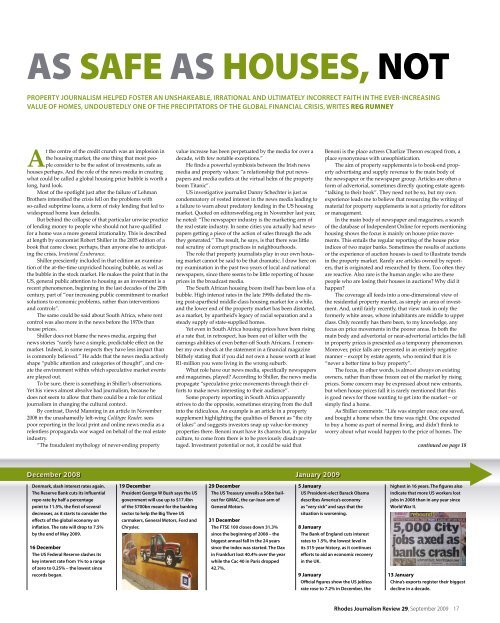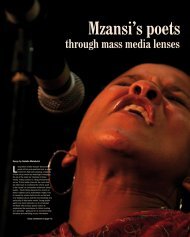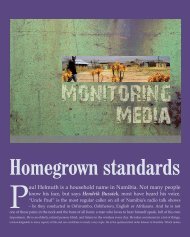Riding on the cup: - Rhodes Journalism Review - Rhodes University
Riding on the cup: - Rhodes Journalism Review - Rhodes University
Riding on the cup: - Rhodes Journalism Review - Rhodes University
Create successful ePaper yourself
Turn your PDF publications into a flip-book with our unique Google optimized e-Paper software.
as safe as hoUses, noT<br />
PROPERTy JOURNAlISm HElPED FOSTER AN UNSHAkEABlE, IRRATIONAl AND UlTImATEly INCORRECT FAITH IN THE EvER-INCREASINg<br />
vAlUE OF HOmES, UNDOUBTEDly ONE OF THE PRECIPITATORS OF THE glOBAl FINANCIAl CRISIS, WRITES reG rUmney<br />
At <strong>the</strong> centre of <strong>the</strong> credit crunch was an implosi<strong>on</strong> in<br />
<strong>the</strong> housing market, <strong>the</strong> <strong>on</strong>e thing that most people<br />
c<strong>on</strong>sider to be <strong>the</strong> safest of investments, safe as<br />
houses perhaps. And <strong>the</strong> role of <strong>the</strong> news media in creating<br />
what could be called a global housing price bubble is worth a<br />
l<strong>on</strong>g, hard look.<br />
Most of <strong>the</strong> spotlight just after <strong>the</strong> failure of Lehman<br />
Bro<strong>the</strong>rs intensified <strong>the</strong> crisis fell <strong>on</strong> <strong>the</strong> problems with<br />
so-called subprime loans, a form of risky lending that led to<br />
widespread home loan defaults.<br />
But behind <strong>the</strong> collapse of that particular unwise practice<br />
of lending m<strong>on</strong>ey to people who should not have qualified<br />
for a home was a more general irrati<strong>on</strong>ality. This is described<br />
at length by ec<strong>on</strong>omist Robert Shiller in <strong>the</strong> 2005 editi<strong>on</strong> of a<br />
book that came closer, perhaps, than any<strong>on</strong>e else to anticipating<br />
<strong>the</strong> crisis, Irrati<strong>on</strong>al Exuberance.<br />
Shiller presciently included in that editi<strong>on</strong> an examinati<strong>on</strong><br />
of <strong>the</strong> at-<strong>the</strong>-time unpricked housing bubble, as well as<br />
<strong>the</strong> bubble in <strong>the</strong> stock market. He makes <strong>the</strong> point that in <strong>the</strong><br />
US, general public attenti<strong>on</strong> to housing as an investment is a<br />
recent phenomen<strong>on</strong>, beginning in <strong>the</strong> last decades of <strong>the</strong> 20th<br />
century, part of “our increasing public commitment to market<br />
soluti<strong>on</strong>s to ec<strong>on</strong>omic problems, ra<strong>the</strong>r than interventi<strong>on</strong>s<br />
and c<strong>on</strong>trols”.<br />
The same could be said about South Africa, where rent<br />
c<strong>on</strong>trol was also more in <strong>the</strong> news before <strong>the</strong> 1970s than<br />
house prices.<br />
Shiller does not blame <strong>the</strong> news media, arguing that<br />
news stories “rarely have a simple, predictable effect <strong>on</strong> <strong>the</strong><br />
market. Indeed, in some respects <strong>the</strong>y have less impact than<br />
is comm<strong>on</strong>ly believed.” He adds that <strong>the</strong> news media actively<br />
shape “public attenti<strong>on</strong> and categories of thought”, and create<br />
<strong>the</strong> envir<strong>on</strong>ment within which speculative market events<br />
are played out.<br />
To be sure, <strong>the</strong>re is something in Shiller’s observati<strong>on</strong>s.<br />
Yet his views almost absolve bad journalism, because he<br />
does not seem to allow that <strong>the</strong>re could be a role for critical<br />
journalism in changing <strong>the</strong> cultural c<strong>on</strong>text.<br />
By c<strong>on</strong>trast, David Manning in an article in November<br />
2008 in <strong>the</strong> unashamedly left-wing Coldtype Reader, sees<br />
poor reporting in <strong>the</strong> local print and <strong>on</strong>line news media as a<br />
relentless propaganda war waged <strong>on</strong> behalf of <strong>the</strong> real estate<br />
industry.<br />
“The fraudulent mythology of never-ending property<br />
value increase has been perpetuated by <strong>the</strong> media for over a<br />
decade, with few notable excepti<strong>on</strong>s.”<br />
He finds a powerful symbiosis between <strong>the</strong> Irish news<br />
media and property values: “a relati<strong>on</strong>ship that put newspapers<br />
and media outlets at <strong>the</strong> virtual helm of <strong>the</strong> property<br />
boom Titanic”.<br />
US investigative journalist Danny Schechter is just as<br />
c<strong>on</strong>demnatory of vested interest in <strong>the</strong> news media leading to<br />
a failure to warn about predatory lending in <strong>the</strong> US housing<br />
market. Quoted <strong>on</strong> editorsweblog.org in November last year,<br />
he noted: “The newspaper industry is <strong>the</strong> marketing arm of<br />
<strong>the</strong> real estate industry. In some cities you actually had newspapers<br />
getting a piece of <strong>the</strong> acti<strong>on</strong> of sales through <strong>the</strong> ads<br />
<strong>the</strong>y generated.” The result, he says, is that <strong>the</strong>re was little<br />
real scrutiny of corrupt practices in neighbourhoods.<br />
The role that property journalists play in our own housing<br />
market cannot be said to be that dramatic. I draw here <strong>on</strong><br />
my examinati<strong>on</strong> in <strong>the</strong> past two years of local and nati<strong>on</strong>al<br />
newspapers, since <strong>the</strong>re seems to be little reporting of house<br />
prices in <strong>the</strong> broadcast media.<br />
The South African housing boom itself has been less of a<br />
bubble. High interest rates in <strong>the</strong> late 1990s deflated <strong>the</strong> rising<br />
post-apar<strong>the</strong>id middle-class housing market for a while,<br />
and <strong>the</strong> lower end of <strong>the</strong> property market has been distorted,<br />
as a market, by apar<strong>the</strong>id’s legacy of racial separati<strong>on</strong> and a<br />
steady supply of state-supplied homes.<br />
Yet even in South Africa housing prices have been rising<br />
at a rate that, in retrospect, has been out of kilter with <strong>the</strong><br />
earnings abilities of even better-off South Africans. I remember<br />
my own shock at <strong>the</strong> statement in a financial magazine<br />
bli<strong>the</strong>ly stating that if you did not own a house worth at least<br />
R1-milli<strong>on</strong> you were living in <strong>the</strong> wr<strong>on</strong>g suburb.<br />
What role have our news media, specifically newspapers<br />
and magazines, played? According to Shiller, <strong>the</strong> news media<br />
propagate “speculative price movements through <strong>the</strong>ir efforts<br />
to make news interesting to <strong>the</strong>ir audience”.<br />
Some property reporting in South Africa apparently<br />
strives to do <strong>the</strong> opposite, sometimes straying from <strong>the</strong> dull<br />
into <strong>the</strong> ridiculous. An example is an article in a property<br />
supplement highlighting <strong>the</strong> qualities of Ben<strong>on</strong>i as “<strong>the</strong> city<br />
of lakes” and suggests investors snap up value-for-m<strong>on</strong>ey<br />
properties <strong>the</strong>re. Ben<strong>on</strong>i must have its charms but, in popular<br />
culture, to come from <strong>the</strong>re is to be previously disadvantaged.<br />
Investment potential or not, it could be said that<br />
December 2008 January 2009<br />
Denmark, slash interest rates again.<br />
The Reserve Bank cuts its influential<br />
repo rate by half a percentage<br />
point to 11.5%, <strong>the</strong> first of several<br />
decreases, as it starts to c<strong>on</strong>sider <strong>the</strong><br />
effects of <strong>the</strong> global ec<strong>on</strong>omy <strong>on</strong><br />
inflati<strong>on</strong>. The rate will drop to 7.5%<br />
by <strong>the</strong> end of may 2009.<br />
16 december<br />
The US Federal Reserve slashes its<br />
key interest rate from 1% to a range<br />
of zero to 0.25% – <strong>the</strong> lowest since<br />
records began.<br />
19 december<br />
President george W Bush says <strong>the</strong> US<br />
government will use up to $17.4bn<br />
of <strong>the</strong> $700bn meant for <strong>the</strong> banking<br />
sector to help <strong>the</strong> Big Three US<br />
carmakers, general motors, Ford and<br />
Chrysler.<br />
29 december<br />
The US Treasury unveils a $6bn bailout<br />
for gmAC, <strong>the</strong> car-loan arm of<br />
general motors.<br />
31 december<br />
The FTSE 100 closes down 31.3%<br />
since <strong>the</strong> beginning of 2008 – <strong>the</strong><br />
biggest annual fall in <strong>the</strong> 24 years<br />
since <strong>the</strong> index was started. The Dax<br />
in Frankfurt lost 40.4% over <strong>the</strong> year<br />
while <strong>the</strong> Cac 40 in Paris dropped<br />
42.7%.<br />
Ben<strong>on</strong>i is <strong>the</strong> place actress Charlize Ther<strong>on</strong> escaped from, a<br />
place syn<strong>on</strong>ymous with unsophisticati<strong>on</strong>.<br />
The aim of property supplements is to book-end property<br />
advertising and supply revenue to <strong>the</strong> main body of<br />
<strong>the</strong> newspaper or <strong>the</strong> newspaper group. Articles are often a<br />
form of advertorial, sometimes directly quoting estate agents<br />
“talking to <strong>the</strong>ir book”. They need not be so, but my own<br />
experience leads me to believe that resourcing <strong>the</strong> writing of<br />
material for property supplements is not a priority for editors<br />
or management.<br />
In <strong>the</strong> main body of newspaper and magazines, a search<br />
of <strong>the</strong> database of Independent Online for reports menti<strong>on</strong>ing<br />
housing shows <strong>the</strong> focus is mainly <strong>on</strong> house price movements.<br />
This entails <strong>the</strong> regular reporting of <strong>the</strong> house price<br />
indices of two major banks. Sometimes <strong>the</strong> results of aucti<strong>on</strong>s<br />
or <strong>the</strong> experience of aucti<strong>on</strong> houses is used to illustrate trends<br />
in <strong>the</strong> property market. Rarely are articles owned by reporters,<br />
that is originated and researched by <strong>the</strong>m. Too often <strong>the</strong>y<br />
are reactive. Also rare is <strong>the</strong> human angle: who are <strong>the</strong>se<br />
people who are losing <strong>the</strong>ir houses in aucti<strong>on</strong>s? Why did it<br />
happen?<br />
The coverage all feeds into a <strong>on</strong>e-dimensi<strong>on</strong>al view of<br />
<strong>the</strong> residential property market, as simply an area of investment.<br />
And, until fairly recently, that view took in <strong>on</strong>ly <strong>the</strong><br />
formerly white areas, whose inhabitants are middle to upper<br />
class. Only recently has <strong>the</strong>re been, to my knowledge, any<br />
focus <strong>on</strong> price movements in <strong>the</strong> poorer areas. In both <strong>the</strong><br />
main body and advertorial or near-advertorial articles <strong>the</strong> fall<br />
in property prices is presented as a temporary phenomen<strong>on</strong>.<br />
Moreover, price falls are presented in an entirely negative<br />
manner – except by estate agents, who remind that it is<br />
“never a better time to buy property”.<br />
The focus, in o<strong>the</strong>r words, is almost always <strong>on</strong> existing<br />
owners, ra<strong>the</strong>r than those frozen out of <strong>the</strong> market by rising<br />
prices. Some c<strong>on</strong>cern may be expressed about new entrants,<br />
but when house prices fall it is rarely menti<strong>on</strong>ed that this<br />
is good news for those wanting to get into <strong>the</strong> market – or<br />
simply find a home.<br />
As Shiller comments: “Life was simpler <strong>on</strong>ce; <strong>on</strong>e saved,<br />
and bought a home when <strong>the</strong> time was right. One expected<br />
to buy a home as part of normal living, and didn’t think to<br />
worry about what would happen to <strong>the</strong> price of homes. The<br />
5 January<br />
US President-elect Barack Obama<br />
describes America’s ec<strong>on</strong>omy<br />
as “very sick” and says that <strong>the</strong><br />
situati<strong>on</strong> is worsening.<br />
8 January<br />
The Bank of England cuts interest<br />
rates to 1.5%, <strong>the</strong> lowest level in<br />
its 315-year history, as it c<strong>on</strong>tinues<br />
efforts to aid an ec<strong>on</strong>omic recovery<br />
in <strong>the</strong> Uk.<br />
9 January<br />
Official figures show <strong>the</strong> US jobless<br />
rate rose to 7.2% in December, <strong>the</strong><br />
c<strong>on</strong>tinued <strong>on</strong> page 18<br />
highest in 16 years. The figures also<br />
indicate that more US workers lost<br />
jobs in 2008 than in any year since<br />
World War II.<br />
13 January<br />
China’s exports register <strong>the</strong>ir biggest<br />
decline in a decade.<br />
<strong>Rhodes</strong> <strong>Journalism</strong> <strong>Review</strong> 29, september 2009 17








